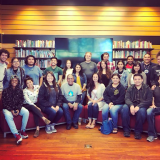
Wilkinson Takes the Lead in Creating Health Humanities Minor
February 19, 2022
A new Wilkinson College interdisciplinary minor will be available for all Chapman students in fall 2022 — Health Humanities, the result of a Wilkinson-led campus-wide faculty collaboration to design the new curriculum.
“I really believe that what happens in this minor can benefit every one of us. It’s an especially good option for Wilkinson students who want to apply arts, humanities, or social science majors to health and consider career options related to public health and health care, especially since those job opportunities are expected to grow at a faster-than-average pace over the next decade,” said Program Director Dr. Anna Leahy (English).
The minor is also important for those majoring in the sciences or health sciences because it offers complexity and real-world applicability to what they’re learning in their major courses. Especially for those students going on to medical school or other advanced degrees in medical fields, this minor will distinguish Chapman students.
The minor will include an Introductory Seminar course (HLHM 100) and electives in disability studies, medical sociology, and medical ethics. Also included under the new minor are opportunities for individual research. Students may find that some of the classes they’ve already completed for their majors will count as electives in the Health Humanities Minor, and according to Dr. Leahy, the minor will continue to add more elective options.
“This spring, Prof. Claudine Jaenichen [Graphic Design] is piloting a course about accessible design in the Art department, and Prof. Danielle Shorr [English] is piloting a course in disability rhetorics in the English department. This minor is set up to flourish over the next few years, especially because it allows students to find personalized paths through the coursework,” said Dr. Leahy.
“As we nurture future designers, educators, leaders, writers, engineers, scientists, and entrepreneurs, it is necessary to recognize the inequities of access and the designed experience,” said Jaenichen.
While Health Humanities is a relatively new academic field, it’s exciting for Wilkinson College to build this minor because it’s a field that, from its inception, has been intradisciplinary and combined the arts, humanities, and social sciences.
“According to the World Health Organization, ‘Health is a state of complete physical, mental and social well-being and not merely the absence of disease or infirmity.’ That kind of breadth makes sense for a Health Humanities program at Chapman University as we use creative and critical approaches to understanding what health means for individuals and communities, locally and globally,” said Dr. Leahy.
The Health Humanities studies health, illness, and health care from humanistic perspectives, namely the arts, humanities, and social sciences that are housed in Wilkinson College. In addition to courses in areas like Anthropology, English, History, Peace Studies, and Religious Studies, the minor includes electives in Integrated Educational Studies and in Food Science and Nutrition, Philosophy, and Psychology, areas that are housed in Schimd College and Crean College.
“We’ve worked closely with Dr. Tara Gruenwald [Crean College] because we think Psychology majors will be especially interested in this minor. We have a lot of potential to build a rigorous, agile, fascinating course of study for both Wilkinson majors and majors across the sciences.”
Health Humanities recognizes that policies, language, environments, and daily realities matter and offers the tools for asking important, often difficult, questions about health, medicine, and health care. Because every individual deals with health, illness, disability, and health care at some point, any student will benefit from this minor.
“This pandemic, for instance, has given long-standing health disparities greater attention, and we need humanistic understandings if we hope to address the inequities. Health and illness are part of every life, but the pandemic has heightened our attention. Students who take Health Humanities courses here at Chapman will bring these humanistic approaches to conversations for the rest of their lives,” said Dr. Leahy.


